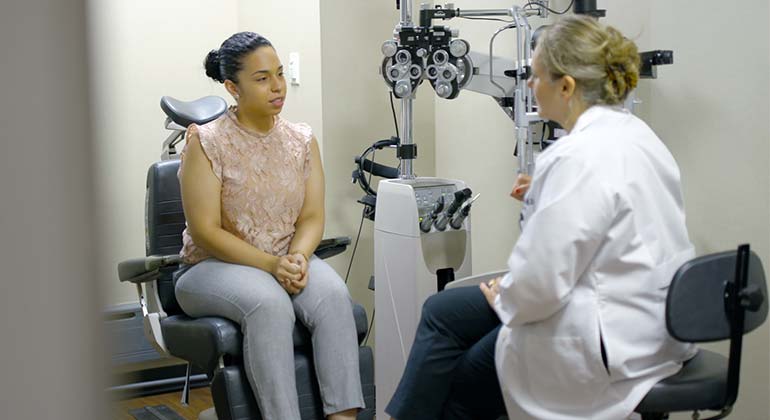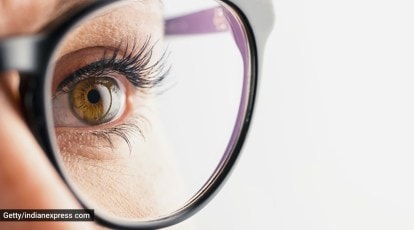Optometrist in Andalusia: Trusted Professionals for Vision Health
Optometrist in Andalusia: Trusted Professionals for Vision Health
Blog Article
Is Refractive Surgical Treatment Right for You? Variables to Consider for Better Eyecare
In the world of eye treatment, the choice to undertake refractive surgical procedure is a crucial one that requires thoughtful factor to consider. From the details of one's eye wellness to the details of individual expectations and daily practices, each element holds importance in the broader landscape of refractive surgical procedure candidacy.
Eye Health And Wellness Examination
When thinking about refractive surgery, a comprehensive eye wellness examination is vital to examine the viability of the procedure for each and every person. eye doctors in andalusia. This evaluation entails a series of tests and exams performed by an eye care specialist to figure out the total wellness of the eyes, the existence of any kind of underlying problems, and the security of the refractive error
During the assessment, different factors are taken into consideration, such as the client's clinical history, current eye prescription, corneal density, pupil dimension, and tear film high quality. These assessments assist to recognize any kind of contraindications to refractive surgery, such as corneal problems, cataracts, or neglected eye infections. In addition, the assessment aids to manage client expectations relating to the possible outcomes of the surgical treatment based upon their distinct eye features.
Inevitably, the eye wellness evaluation is important in making sure the security and performance of refractive surgery, as it gives important insights into the individual's eye health standing and helps determine the most ideal treatment alternatives for attaining optimal aesthetic end results. (eye center andalusia)
Way Of Living Analysis
A detailed way of life analysis is essential in determining the suitability of refractive surgical procedure for an individual's visual correction requirements. Way of living elements such as line of work, hobbies, and day-to-day activities play a vital role in the decision-making procedure regarding refractive surgical treatment.
Furthermore, way of life routines such as sporting activities involvement, exterior activities, or even skin care regimens can influence the healing process and overall success of refractive surgery. People that engage in get in touch with sporting activities might require to take extra preventative measures to safeguard their eyes during the recovery period. In addition, people with extensive sunlight exposure might need additional post-operative like avoid difficulties. By performing a thorough lifestyle evaluation, eye treatment professionals can customize their recommendations and treatment strategies to meet the distinct needs of each individual, ultimately leading to enhanced visual outcomes and contentment.
Expectation Placement

Establishing reasonable assumptions entails detailed pre-operative conversations between the eye doctor and the individual. The doctor should transparently communicate the possible dangers, benefits, and restrictions of the treatment (eye center andalusia). Clients require to understand that while many people achieve 20/20 vision or better following refractive surgical procedure, some may still call for glasses for sure activities like reading or driving at evening. Handling these expectations aids avoid dissatisfaction and discontentment post-surgery, leading to a much more favorable overall experience for the patient.
Threat Evaluation

Aspects that may boost the danger of problems include age, certain medical conditions like autoimmune diseases, unpredictable vision prescription, slim corneas, and impractical client expectations. In addition, selecting a knowledgeable and experienced cosmetic surgeon, adhering to pre and post-operative treatment instructions faithfully, and disclosing any type of relevant clinical background can assist alleviate dangers.
To lessen the possibility of problems, eye doctors conduct thorough pre-operative analyses to recognize any type of contraindications to surgery. They additionally discuss the possible threats and advantages with individuals throughout the examination procedure. By taking part in open interaction and shared decision-making, both the ophthalmologist and the person can interact to determine if refractive surgical treatment is the right choice based on individual risk accounts and preferred results.
Examination Importance
Thinking about the critical function of informed decision-making in evaluating threats and prospective complications in refractive surgical treatment, the consultation procedure holds significant relevance in assisting patients in the direction of optimal end results. During the examination, the ophthalmologist reviews the patient's eye wellness, refractive errors, and general suitability for surgery. This first evaluation is vital in figuring out one of the most ideal procedure for every individual, thinking about factors such as corneal thickness, student dimension, and existing eye problems.
Moreover, the assessment works as a possibility for individuals to discuss their expectations, problems, and any kind of questions they may have regarding the surgery. Clear interaction in between the client and the surgeon is important to make sure reasonable assumptions and a thorough understanding of the potential threats and benefits included.
Additionally, the consultation allows the specialist to explain the various medical options available, their corresponding outcomes, and the post-operative treatment called for. This detailed discussion empowers people to make educated decisions about their eye care, bring about far better satisfaction and results post-surgery.
Conclusion
In conclusion, people considering refractive surgical treatment needs to go through an extensive eye health analysis, assess their way of living behaviors, align here are the findings their expectations with potential end results, examine the associated dangers, and focus on assessments with eye care professionals. These aspects play an important duty in figuring out the viability of refractive surgical procedure for every person, additional reading making certain optimum results and contentment with the procedure.
People considering refractive surgical procedure frequently have high assumptions concerning the outcomes, anticipating best vision without the demand for glasses or contact lenses. While refractive surgical procedure can greatly boost vision and reduce reliance on aesthetic help, it is vital for patients to understand that outcomes might differ based on private factors such as the level of refractive mistake, corneal density, and overall eye health and wellness.
By engaging in open communication and shared decision-making, both the individual and the look here eye doctor can function with each other to identify if refractive surgical treatment is the best selection based on individual risk accounts and preferred end results.
Thinking about the essential duty of educated decision-making in evaluating threats and possible difficulties in refractive surgical procedure, the consultation procedure holds considerable value in assisting people towards optimum results. Throughout the consultation, the ophthalmologist examines the person's eye health and wellness, refractive errors, and total suitability for surgical treatment.
Report this page